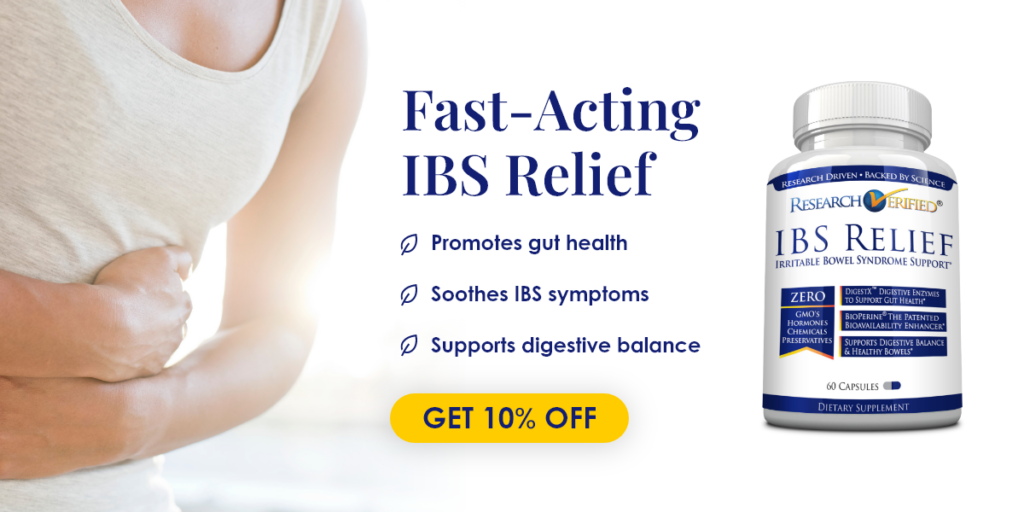Grocery shopping can be a daunting task for those with irritable bowel syndrome (IBS). Knowing which foods to choose and which to avoid can make all the difference in managing IBS symptoms (1). In this blog post, we will go over a list of healthy foods that people with IBS should avoid and healthy alternatives they can choose. With the right knowledge and grocery list, you can make sure your shopping trip is an easy and stress-free experience. Read on to learn more about how to build your IBS-friendly grocery list.
What shouldn’t I Eat?
For people with IBS, certain healthy foods can cause more harm than good. For example, some of the most commonly consumed fruits and vegetables contain compounds like fructans which are harder to digest. These foods are known to cause bloating, gas, and abdominal pain in people with IBS.
One general rule to stick to is avoiding high FODMAP foods. FODMAPs – Fermentable Oligosaccharides, Disaccharides, Monosaccharides, and Polyols – are a type of carbohydrate found in a variety of fruits, vegetables, grains, and dairy products. Eating foods that contain high levels of FODMAPs can lead to bloating, gas, and other digestive issues (2).
Let’s take a look at healthy foods that people with IBS may want to avoid:
FOODS TO AVOID WITH IBS

- Dairy products – Dairy is a common trigger food for people with IBS, and should be avoided. This includes cow’s milk, cheese, butter, yogurt, ice cream, and other dairy products. Lactose, the sugar found in dairy, can be difficult to digest, leading to uncomfortable symptoms like bloating, gas, and diarrhea. Fortunately, there are plenty of dairy-free alternatives that can provide similar nutrition. For instance, nut milks such as almond milk and cashew milk are excellent substitutes for cow’s milk.
- Cruciferous vegetables – Cruciferous vegetables such as broccoli, Brussels sprouts, cauliflower, and cabbage are incredibly healthy. However, their high fiber content can cause gas and bloating for those with IBS. They also contain compounds called thiocyanates and isothiocyanates, which can be irritating to the digestive tract. Additionally, they may cause an increase in stomach acid production, leading to further digestive discomfort. If you have IBS, it is best to avoid these vegetables or eat them in moderation.
- Beans and legumes – Beans and legumes are a great source of protein and other important nutrients. Unfortunately, they can also be a trigger for people with IBS, as they contain high levels of FODMAPs. If you have IBS, you should avoid eating beans and legumes, or limit your intake to small amounts. If you do choose to consume beans and legumes, try soaking them overnight before cooking to reduce their FODMAP content.
- Insoluble fiber – Insoluble fiber is an important part of a healthy diet, but it can be difficult to digest if you have IBS. Insoluble fiber doesn’t dissolve in water, so it moves quickly through the digestive system, leading to gas and bloating. Foods that are high in insoluble fiber include wheat bran, whole grains, and the skins of some fruits and vegetables. While insoluble fiber may be hard to digest, it’s still important to get enough of it. Try reducing your portion sizes and be sure to drink plenty of water when consuming insoluble fiber to help your body process it.
- Garlic and onion – Garlic and onions can be difficult for those with IBS, as they contain high levels of FODMAPs. If you do choose to eat them anyway, it’s best to have them cooked rather than raw. This is because cooking helps to break down the FODMAPs and make them easier to digest. In addition to FODMAPs, garlic and onions also contain high levels of fiber, which, as mentioned, can be difficult for people with IBS to digest. For this reason, it is important to eat garlic and onions in moderation if you have IBS.

What Can I eat intead?
When it comes to foods that people with IBS can eat, it’s important to focus on nutrient-rich options that provide the body with the energy and vitamins it needs to stay healthy. Doctors often advise those suffering from IBS to follow a low FODMAP diet. This diet’s main focus is limiting the intake of foods rich in certain types of carbohydrates. Here are some healthy, nutritious foods that are IBS-friendly:
FOODS TO EAT WITH IBS
- Lean meats – A lot of meats contain high levels of saturated fat, which can cause digestive discomfort. However, lean meats are an excellent source of protein while containing little saturated fat. These include white chicken or turkey meat and lean cuts of beef.
- Eggs – Another excellent source of protein, eggs are easily digested and are usually well-tolerated by people with IBS. However, everyone is different, and not every person’s body will react the same to eggs. Therefore, it’s worth trying different methods of preparation (soft-boiled, hard-boiled, poached, scrambled, omelet, etc.) to see what works best for you.
- Low FODMAP fruits and vegetables – These include fruits like bananas, blueberries, strawberries, avocados, and kiwis, as well as vegetables such as kale, lettuce, carrots, bell peppers, and potatoes. They are rich in nutrients and good for your gut flora, but are less likely to cause digestive discomfort than high FODMAP fruits and veggies. For those with extra-sensitive stomachs, cooking the vegetables instead of eating them raw can also help ease digestion.
- Nuts and seeds – High in protein, fiber, omega-3, minerals, and other nutrients, nuts and seeds make the perfect addition to your diet. These include nuts such as almonds, walnuts, pecans, and hazelnuts as well as seeds such as chia, pumpkin, sunflower, and flaxseed. Just make sure not to overdo it, as nuts do contain insoluble fiber that can worsen diarrhea.

In Conclusion
If you suffer from IBS, it’s essential to understand which foods trigger your symptoms and which ones you can eat without issue. By avoiding foods that are high in FODMAPs, such as dairy, gluten, and high-fructose corn syrup, you may find that your symptoms improve.
Try to incorporate low-FODMAP foods like lean protein, fruits, vegetables, and gluten-free grains into your diet. Be sure to read food labels carefully and make a grocery list before going to the store. Additionally, be mindful of your portion sizes and eat slowly to help prevent symptoms from flaring up.
Remember that everyone’s body is different, and what works for one person may not work for another. It’s important to work with your healthcare provider or a registered dietitian to create a personalized nutrition plan that fits your needs.
By making informed food choices and incorporating healthy alternatives into your diet, you can manage your IBS symptoms and lead a more comfortable, enjoyable life. Happy shopping!



